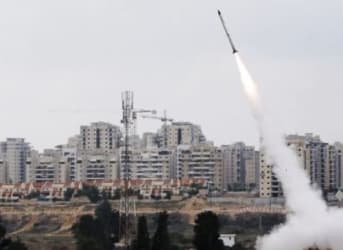With the words “World War Three” being bandied about, it’s tough to decide which story to start with, but with the killing of at least 16 people (some reports say 15) by an apparent rocket strike of a U.N.-run school sheltering Palestinians in Northern Gaza, the Israeli/Palestinian conflict seemed to come into the sharpest focus as this week came to a close. Just one day after U.S. Secretary of State John Kerry left his Cairo diplomacy headquarters to make a surprise visit to press Israeli Prime Minister Benjamin Netanyahu into a ceasefire, the attack seemed to dash any hope for calm in the Gaza Strip any time soon.
The attack brings the Palestinian death toll to at least 757 people, according to this report. At least 30 Israelis have also been killed, a far smaller number, yet one that has grown sharply over the last few weeks. Palestinian Minister of Health Jawad Awad warned of what he says are the impending health and environmental dangers that threaten the Gaza Strip if rescue crews are not allowed to remove the bodies of victims of the fight. Awad asked for support from the international community to convince Israel to cease fire at least long enough for rescue teams to tend to the victims – both living and dead.
The U.N. Human Rights Council voted Wednesday to launch an investigation into the allegation that Israel is committing war crimes in Gaza. The council also condemned Hamas’ actions, calling their attacks “indiscriminate.” Netanyahu was incensed at this claim and blamed the entire council for not holding Hamas accountable for their actions – the U.S. voted against launching the investigation, while the European countries abstained from voting.
The one bit of good news about Israel comes from the Federal Aviation Administration. The agency announced late Wednesday night that, after reviewing any safety concerns and in light of new precautions being taken by Israel, it would allow the resumption of U.S. flights into and out of Ben Gurion International Airport in Tel Aviv, Israel. The ban was placed after a Hamas rocket struck about a mile away from the airport.
All eyes, however, are also still firmly set on Russia, Ukraine and the destruction of Malaysian Flight MH17. The flight was shot down last week using, what the U.S. alleges, is a Russian-made and Russian-provided Bulk surface to air missile over Ukraine’s eastern border. The U.S. announced Thursday that it has evidence that Russia “has fired artillery across the border targeting Ukrainian military positions.” In fact, some believe that’s what happened at the time of MH17’s demise – that pro-Russian separatists shot down the commercial airliner by mistake. That seems implausible, but it is clear that the separatists are going after Ukrainian military aircraft. Just days after the MH17 tragedy, separatists shot at four Ukrainian SU-25 jets, bringing two of them down. The pilots are thought to have bailed-out over rebel-held territory. Ukraine has lost at least ten military aircraft to Pro-Russian separatist fire.
Related Article: The Coming Storm In The Middle East
The separatist attacks are also hindering the cleanup and investigation of flight MH17. Dutch Prime Minister Mark Rutte announced that 40 unarmed police will be dispatched to the crash site in order to find the rest of the victims. The remains that have been recovered arrived in the Netherlands this week and were taken to a Dutch military base for identification – likely by DNA matching methods. According to investigators, it may take months before all remains are accounted for, but Australian Prime Minister Tony Abbott fears that a lack of security at the crash site will result in bodies going permanently unrecovered. He proposed a multinational task force to secure the site, suggesting that the countries most heavily affected by the tragedy – Australia, the Netherlands and Malaysia – lead the way.
Meanwhile, the U. S. and Canada have announced that they will attempt to increase economic pressure on Russia by opposing World Bank investment projects in their country. The World Bank currently has 10 investment projects in Russia totaling $668 million, but has plans for 9 more plans that would infuse another $1.34 billion into the country. The U.S. and Canada account for about one-fifth of the 188-member bank, so their “nay” votes may not bring down the projects entirely, but they could significantly delay the process.
Back in Iraq – The Baiji refinery is still under siege. The Islamic State of Iraq and al-Sham (ISIS) is still laying siege to Iraq’s largest oil refinery. While a highly skilled team of Iraqi soldiers has managed to fend the militants off so far, ISIS has managed to take control of the surrounding areas - cutting off pipelines and roads to the facility, rendering it unusable. In other parts of Iraq, ISIS has been smuggling increasing amounts of crude oil to buyers in the Kurdistan area. Basically kicking the Iraqi oil industry when its down, this practice is nonetheless estimated to earn ISIS a cool $1 million dollars a day.
By. James Burgess of Oilprice.com


















